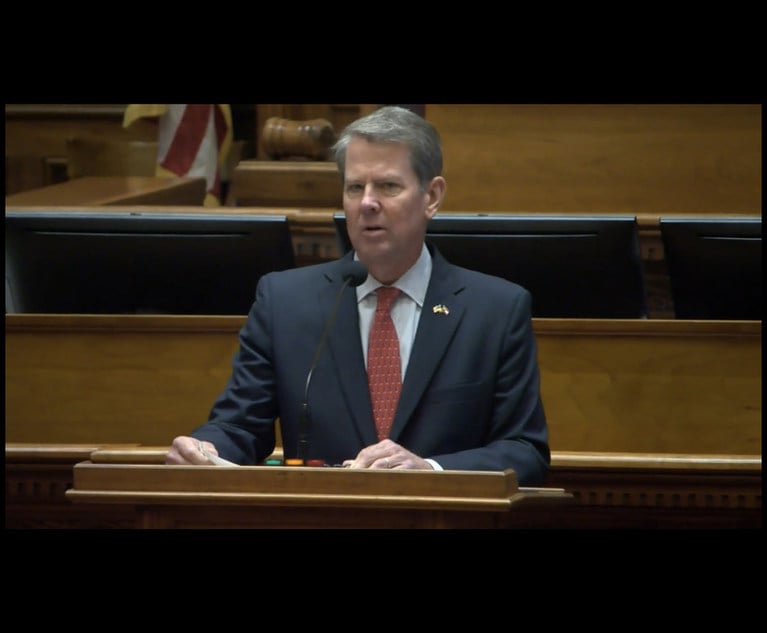Public Defender Council Would Furlough Staff to Meet Governor's Budget Cut Mandate
The council, which provides defense counsel to indigent criminal defendants, has asked to exempt staff wages from Gov. Brian Kemp's directive that state agencies cut 4% from their FY 2020 budget and 6% from their FY 2021 budget.
September 23, 2019 at 04:01 PM
6 minute read
 Bryan Tyson (left) and Stephen Bright. (Photos: John Disney/ALM)
Bryan Tyson (left) and Stephen Bright. (Photos: John Disney/ALM)
The Georgia Public Defender Council will have to furlough public defenders across the state for 10 days between now and next June to meet Gov. Brian Kemp's budget-cut requests, according to state budget documents.
In addition, the council—which provides lawyers to indigent criminal defendants across the state—has proposed the elimination of its capital defender office in fiscal year 2021 to save an additional $4.3 million in state funds. That proposal is dependent on passage of a state law abolishing the death penalty.
In August, Kemp directed state agencies to cut 4% percent from their FY 2020 budget, which ends June 30, 2020, and 6% from their FY 2021 budget. Kemp notified the agencies that he intended for the requested cuts to take effect beginning Oct. 1. He said he was ordering the cuts in order to fund a number of "strategic goals." Those goals reflect campaign promises the governor made prior to his election last November.
Georgia has more than $2.5 billion in its reserve "rainy day fund," according to state budget documents.
Council officials wouldn't comment on the new budget directives. But in memos to the Governor's Office of Planning and Budget, the council's interim director, Jimmonique Rodgers, has asked the governor and his budget staff to exempt public defender salaries, arguing that agency expenditures are "aligned with constitutional and statutory requirements."
On Monday, the director of the governor's Office of Planning and Budget sent a memo to state agency heads stating that despite the Kemp's goal of a "leaner" state government, "Budget reductions are meant to identify opportunities to make state government more efficient through technology, by eliminating duplicative services, or by streamlining regulations, not through eliminating core services to taxpayers or across the board reductions in force or furloughs."
The memo asked agencies proposing a reduction in force or services to contact his office to explain why "alternative scenarios or other efficiencies" are not an option.
The memo was forwarded to The Daily Report by Kemp spokeswoman Candice Broce in response to questions about whether the governor might grant the PDC's exemption request or support eliminating the death penalty in order to achieve his budget goals.
"Public defender offices are much like hospital emergency rooms. We must accept every eligible client that needs our services," Rodgers said in an Aug. 20 memo The Daily Report obtained in response to a public records request. "The absence of counsel means that the prosecutors cannot try cases, and the courts' criminal dockets stall. This poses not only a logistical problem for local jails, prosecutors and courts, but also one of public safety and constitutional concerns,
More than 90% of council funds are dedicated to paying the salaries and benefits of public defenders across the state, contracting with private attorneys to avoid conflicts associated with defending multiple co-defendants in a single circuit, payments to defense experts, and travel expenses associated with defending cases, the memo said.
Contract public defenders are paid a flat fee that doesn't include mileage reimbursements, Rodgers' memo said. Without an exemption from the governor, those contracts will also have to be reduced, she said.
District attorneys and their staffs are not included in the governor's proposed budget cuts, nor are members of the state judiciary.
Kemp's goals include reducing gang activity and human trafficking, according to state budget documents. Doing so will likely increase criminal prosecutions involving multiple defendants that would require additional lawyers in order to avoid conflicts that could arise if defendants were represented by a single defender, Rodgers' memo said.
The number of funded positions also is dictated by state law and consent decrees stemming from previous lawsuits challenging the constitutional inadequacy of what was until 2003 an informal patchwork of county-appointed public defenders. But the agency is "historically lean," according to the memo.
Public defenders opened 144,224 new cases in the state's 43 circuits in FY 2019—a 20% increase since FY 2017, the memo said.
Four positions at the central office have been open for months, according to Rodgers' memo. The council also didn't receive state funds this year to hire nine juvenile public defenders mandated by state law.
'Starve the defense'
Attorney Bryan Tyson, a partner at the Atlanta offices of Taylor English Duma who served as the council's executive director from 2015-2018, said his biggest concern about cutting agency funding "is that the judges and prosecutors are not having to make similar cuts."
"Having public defenders furloughed at this time means slowing down the system. And that's not good for anybody," he said. "You can only prosecute people as fast as a public defender can defend them."
The council, he added, "is still underfunded, compared to what it really needs to be."
Tyson also defended the capital defender office, saying it is staffed with "extremely high quality lawyers," and is currently considered a model for capital defenders across the country. Even though there are fewer death penalty cases being tried, he said that capital caseload has remained "relatively steady" because of appeals and reversals of some death cases that must be retried. Tyson also expressed skepticism that the state legislature would bar the death penalty any time soon.
"One of the major problems that has been identified when you greatly increase resources on the prosecution side and don't have the same kind of increase on the defense side, cases are not properly defended," said Stephen Bright, a law professor at Yale and Georgia State universities, who as head of the Southern Center for Human Rights successfully sued a number of Georgia counties over inadequate or nonexistent public defenders. "If you want to guarantee innocent people are convicted in Georgia courts, cut the public defender budget."
Bright said that having full-time public defenders who are trained, supervised and provide high-quality professional representation is essential to the integrity of the criminal justice system.
"We know the overwhelming majority of people accused of crimes in the court system cannot afford a lawyer," he added. "An adversary system cannot work if you starve the defense."
Bright said that until former Gov. Sonny Perdue, now U.S. secretary of agriculture, signed the law establishing the Public Defender Council, the ad-hoc system of contract public defenders was "an absolute disgrace."
"You can't snap your fingers and create a public-defender system overnight," he added. "It takes time and resources and people. … Having full-time public defenders who are trained, who are supervised, providing high-quality professional representation is essential to the integrity of the adversary system."
This content has been archived. It is available through our partners, LexisNexis® and Bloomberg Law.
To view this content, please continue to their sites.
Not a Lexis Subscriber?
Subscribe Now
Not a Bloomberg Law Subscriber?
Subscribe Now
NOT FOR REPRINT
© 2025 ALM Global, LLC, All Rights Reserved. Request academic re-use from www.copyright.com. All other uses, submit a request to [email protected]. For more information visit Asset & Logo Licensing.
You Might Like
View All
Georgia Republicans Push to Limit Lawsuits. But Would That Keep Insurance Rates From Rising?
5 minute read
A Plan Is Brewing to Limit Big-Dollar Suits in Georgia—and Lawyers Have Mixed Feelings
10 minute read
Panel to Decide if Governor Should Suspend Georgia Lawyer From Elected Post
4 minute readTrending Stories
- 1Inherent Diminished Value Damages Unavailable to 3rd-Party Claimants, Court Says
- 2Pa. Defense Firm Sued by Client Over Ex-Eagles Player's $43.5M Med Mal Win
- 3Losses Mount at Morris Manning, but Departing Ex-Chair Stays Bullish About His Old Firm's Future
- 4Zoom Faces Intellectual Property Suit Over AI-Based Augmented Video Conferencing
- 5Judge Grants TRO Blocking Federal Funding Freeze
Who Got The Work
J. Brugh Lower of Gibbons has entered an appearance for industrial equipment supplier Devco Corporation in a pending trademark infringement lawsuit. The suit, accusing the defendant of selling knock-off Graco products, was filed Dec. 18 in New Jersey District Court by Rivkin Radler on behalf of Graco Inc. and Graco Minnesota. The case, assigned to U.S. District Judge Zahid N. Quraishi, is 3:24-cv-11294, Graco Inc. et al v. Devco Corporation.
Who Got The Work
Rebecca Maller-Stein and Kent A. Yalowitz of Arnold & Porter Kaye Scholer have entered their appearances for Hanaco Venture Capital and its executives, Lior Prosor and David Frankel, in a pending securities lawsuit. The action, filed on Dec. 24 in New York Southern District Court by Zell, Aron & Co. on behalf of Goldeneye Advisors, accuses the defendants of negligently and fraudulently managing the plaintiff's $1 million investment. The case, assigned to U.S. District Judge Vernon S. Broderick, is 1:24-cv-09918, Goldeneye Advisors, LLC v. Hanaco Venture Capital, Ltd. et al.
Who Got The Work
Attorneys from A&O Shearman has stepped in as defense counsel for Toronto-Dominion Bank and other defendants in a pending securities class action. The suit, filed Dec. 11 in New York Southern District Court by Bleichmar Fonti & Auld, accuses the defendants of concealing the bank's 'pervasive' deficiencies in regards to its compliance with the Bank Secrecy Act and the quality of its anti-money laundering controls. The case, assigned to U.S. District Judge Arun Subramanian, is 1:24-cv-09445, Gonzalez v. The Toronto-Dominion Bank et al.
Who Got The Work
Crown Castle International, a Pennsylvania company providing shared communications infrastructure, has turned to Luke D. Wolf of Gordon Rees Scully Mansukhani to fend off a pending breach-of-contract lawsuit. The court action, filed Nov. 25 in Michigan Eastern District Court by Hooper Hathaway PC on behalf of The Town Residences LLC, accuses Crown Castle of failing to transfer approximately $30,000 in utility payments from T-Mobile in breach of a roof-top lease and assignment agreement. The case, assigned to U.S. District Judge Susan K. Declercq, is 2:24-cv-13131, The Town Residences LLC v. T-Mobile US, Inc. et al.
Who Got The Work
Wilfred P. Coronato and Daniel M. Schwartz of McCarter & English have stepped in as defense counsel to Electrolux Home Products Inc. in a pending product liability lawsuit. The court action, filed Nov. 26 in New York Eastern District Court by Poulos Lopiccolo PC and Nagel Rice LLP on behalf of David Stern, alleges that the defendant's refrigerators’ drawers and shelving repeatedly break and fall apart within months after purchase. The case, assigned to U.S. District Judge Joan M. Azrack, is 2:24-cv-08204, Stern v. Electrolux Home Products, Inc.
Featured Firms
Law Offices of Gary Martin Hays & Associates, P.C.
(470) 294-1674
Law Offices of Mark E. Salomone
(857) 444-6468
Smith & Hassler
(713) 739-1250







